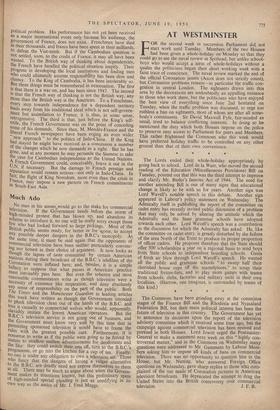Much Ado
No man in his senses.would go to the stake for commercial television. If the Government bends before the storm of high-minded protest that has blown up, and abandons its scheme to introduce it, no one will be really sorry except those few who had looked forward to large pickings. Most of the British public seems ready, for better or for vorse, to accept any possible deeper dangers in the B.B.C's monopoly. At the same time, it must be said again that the opponents of commercial television have been neither particularly convinc- ing nor honest in their choice of argument. It now looks as though the lapses of taste committed by certain American stations during their broadcast of the B.B.C.'s telefilms of the Coronation were inflated here; and, besides, it is a simple fallacy to suppose that what passes in American practice must inevitably pass here. But even the soberest and most reasonable commentators write as though television were a necessity of existence like respiration, and deny absolutely any sense of responsibility on the part of the public. Both The Times and the Manchester Guardian in leading articles this week have written as though the Government intended to pluck television clean out of the hands of the B.B.C. and toss it casually to commercial wolves who would, apparently, slavishly imitate the lowest American operators. But the B.B.C.'s television service is not going out of business, and the Government must know very well by this time that in Permitting sponsored television it would have to frame the rules with the greatest possible care. Furthermore, it is nonsense to write as if the public were going to be forced by statute to swallow endless advertisements for deodorants and the like : they could switch their sets off, turn to the B.B.C.'s programme, or go into the kitchen for a cup of tea. Finally, no one is under any obligation to own a television set. Those who fancy that the dangers of having a vulgar alternative to the B.B.C. are deadly need not expose themselves to them at all. There may be much to argue about when the Govern- ment makes its intentions known, but this preliminary spate of high-minded special pleading is just as unedifying in its own way as the antics of Mr. J. Fred Muggs.


















































 Previous page
Previous page